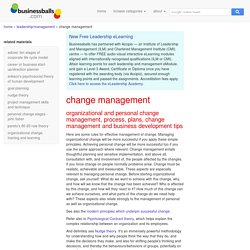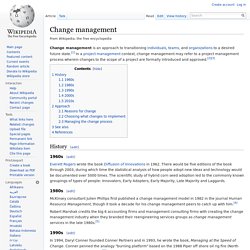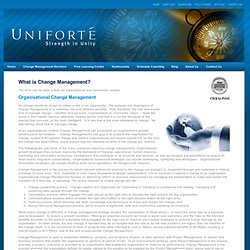

Accenture Resources. 10 Principles of Change Management. Updated: 10 Principles of Leading Change Management This classic guide to organizational change management best practices has been updated for the current business environment.

To read the newest article, click here. Or, to watch a related video, click on the play button above. Way back when (pick your date), senior executives in large companies had a simple goal for themselves and their organizations: stability. Shareholders wanted little more than predictable earnings growth. Market transparency, labor mobility, global capital flows, and instantaneous communications have blown that comfortable scenario to smithereens. This presents most senior executives with an unfamiliar challenge. Long-term structural transformation has four characteristics: scale (the change affects all or most of the organization), magnitude (it involves significant alterations of the status quo), duration (it lasts for months, if not years), and strategic importance. 1. 2. 3. 4. 5. 6. 7. 8. 9. 10. Change management principles, process, tips and change theory and models. Instead, change needs to be understood and managed in a way that people can cope effectively with it.

Change can be unsettling, so the manager logically needs to be a settling influence. Check that people affected by the change agree with, or at least understand, the need for change, and have a chance to decide how the change will be managed, and to be involved in the planning and implementation of the change. Use face-to-face communications to handle sensitive aspects of organisational change management (see Mehrabian's research on conveying meaning and understanding). Encourage your managers to communicate face-to-face with their people too if they are helping you manage an organizational change. Email and written notices are extremely weak at conveying and developing understanding. If you think that you need to make a change quickly, probe the reasons - is the urgency real?
Be mindful that the chief insecurity of most staff is change itself. Responsibility for managing change see also. Change management. Change management is an approach to transitioning individuals, teams, and organizations to a desired future state.[1] In a project management context, change management may refer to a project management process wherein changes to the scope of a project are formally introduced and approved.[2][3] History[edit] 1960s[edit] Everett Rogers wrote the book Diffusion of Innovations in 1962.

There would be five editions of the book through 2003, during which time the statistical analysis of how people adopt new ideas and technology would be documented over 5000 times. The scientific study of hybrid corn seed adoption led to the commonly known groupings of types of people: Innovators, Early Adopters, Early Majority, Late Majority and Laggards. 1980s[edit] McKinsey consultant Julien Phillips first published a change management model in 1982 in the journal Human Resource Management, though it took a decade for his change management peers to catch up with him.[4] 1990s[edit] 2000s[edit] 2010s[edit] What is Change Management. The term can be used in both an organisational and community context.

Organisational Change Management All change should be driven by either a risk or an opportunity. The purpose and importance of Change Management is to minimise risk and optimise benefits. Truly therefore, the one who knows how to manage change – whether of a personal, organisational or community nature – holds the world in their hands. Famous naturalist, Charles Darwin said that it is not the strongest of the species that survives, or the most intelligent. In an organisational context, Change Management can accomplish an organisation’s growth, turnaround or termination. The following are just some of the many scenarios requiring change management. Change Management is the process by which relevant individuals involved in the change are engaged in, supported through and sustained in making a change of some kind.